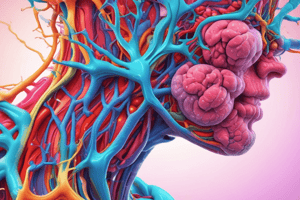Podcast
Questions and Answers
What are the primary biochemical regulators used by the endocrine system to maintain homeostasis?
What are the primary biochemical regulators used by the endocrine system to maintain homeostasis?
- Enzymes
- Vitamins
- Hormones (correct)
- Neurotransmitters
Which of the following is NOT a class of hormones based on their structure?
Which of the following is NOT a class of hormones based on their structure?
- Peptide hormones
- Carbohydrate hormones (correct)
- Amino acid derivatives
- Steroid hormones
What type of endocrine disease originates from the target organ?
What type of endocrine disease originates from the target organ?
- Tertiary disease
- Primary disease (correct)
- Secondary disease
- Ectopic disease
How does the endocrine system regulate hormone synthesis and release?
How does the endocrine system regulate hormone synthesis and release?
Which type of hormone is characterized by being lipid soluble and derived from cholesterol?
Which type of hormone is characterized by being lipid soluble and derived from cholesterol?
What is the primary cause of excess growth hormone leading to gigantism in children?
What is the primary cause of excess growth hormone leading to gigantism in children?
Which of the following is NOT a consequence of acromegaly?
Which of the following is NOT a consequence of acromegaly?
What test is essential for diagnosing acromegaly?
What test is essential for diagnosing acromegaly?
What is a symptom of diabetes insipidus due to decreased ADH?
What is a symptom of diabetes insipidus due to decreased ADH?
What is the primary treatment for growth hormone deficiency?
What is the primary treatment for growth hormone deficiency?
Which of the following is associated with excess prolactin levels in men?
Which of the following is associated with excess prolactin levels in men?
What laboratory finding would indicate a lack of response in a patient with diabetes insipidus?
What laboratory finding would indicate a lack of response in a patient with diabetes insipidus?
Which option describes a consequence of excess ACTH?
Which option describes a consequence of excess ACTH?
What hormone is primarily responsible for water retention in the body?
What hormone is primarily responsible for water retention in the body?
Which of the following conditions may result from a deficiency in pituitary hormones?
Which of the following conditions may result from a deficiency in pituitary hormones?
What is a notable symptom of Syndrome of Inappropriate Antidiuretic Hormone Secretion (SIADH)?
What is a notable symptom of Syndrome of Inappropriate Antidiuretic Hormone Secretion (SIADH)?
What is the main control function of the hypothalamus over the pituitary gland?
What is the main control function of the hypothalamus over the pituitary gland?
Which hormone does the anterior pituitary NOT produce?
Which hormone does the anterior pituitary NOT produce?
What laboratory finding is indicative of SIADH?
What laboratory finding is indicative of SIADH?
Which gland helps regulate the secretion of tropic hormones?
Which gland helps regulate the secretion of tropic hormones?
Which of the following is a cause of excessive ADH secretion?
Which of the following is a cause of excessive ADH secretion?
Which hormone is primarily produced in the thyroid gland to help regulate metabolism?
Which hormone is primarily produced in the thyroid gland to help regulate metabolism?
What condition is characterized by an enlarged thyroid gland?
What condition is characterized by an enlarged thyroid gland?
What is the consequence of excess thyroid hormone on TSH secretion?
What is the consequence of excess thyroid hormone on TSH secretion?
Which of the following describes the signs of hypothyroidism?
Which of the following describes the signs of hypothyroidism?
What is the primary cause of primary hypothyroidism?
What is the primary cause of primary hypothyroidism?
What vital role does T4 primarily play in the body?
What vital role does T4 primarily play in the body?
Which of the following scenarios would lead to decreased levels of TSH?
Which of the following scenarios would lead to decreased levels of TSH?
Which underlying factor is often linked to congenital hypothyroidism?
Which underlying factor is often linked to congenital hypothyroidism?
What is the primary function of cortisol in the body?
What is the primary function of cortisol in the body?
Which part of the adrenal gland is responsible for producing adrenaline and noradrenaline?
Which part of the adrenal gland is responsible for producing adrenaline and noradrenaline?
What triggers the release of aldosterone from the adrenal glands?
What triggers the release of aldosterone from the adrenal glands?
Which condition is characterized by decreased secretion of adrenal hormones?
Which condition is characterized by decreased secretion of adrenal hormones?
What symptoms might indicate the presence of Addison's disease?
What symptoms might indicate the presence of Addison's disease?
What are the expected laboratory results in a patient with Cushing's syndrome?
What are the expected laboratory results in a patient with Cushing's syndrome?
Which hormones are classified as mineralocorticoids?
Which hormones are classified as mineralocorticoids?
What physiological response is primarily driven by catecholamines such as epinephrine?
What physiological response is primarily driven by catecholamines such as epinephrine?
Which of the following is not a function of aldosterone?
Which of the following is not a function of aldosterone?
What characterizes the diurnal variation of cortisol levels?
What characterizes the diurnal variation of cortisol levels?
Flashcards are hidden until you start studying
Study Notes
Overview of the Endocrine System
- Control mechanisms are achieved by biochemical regulators such as hormones, paracrine factors, and autocrine factors.
Types of Hormones
- Hormones are classified by their structure into peptide/polypeptides, amino acid derivatives, and steroid hormones.
- Peptide/polypeptides – vary in size but work the same way, e.g., insulin, GH, PTH, glucagon
- Amino acid derivatives are water-soluble (catecholamines) or lipid-soluble, synthesised by the thyroid gland and adrenal medulla.
- Steroid hormones are derived from cholesterol, not stored, and are lipid-soluble, e.g., cortisol, aldosterone, testosterone, estrogen, and progesterone.
Negative Feedback in the Hypothalamus-Pituitary-Endocrine Gland Axis
- The endocrine system uses a negative feedback system to control hormone synthesis and release, e.g., thyroid hormone production.
Disease Processes of the Endocrine System
- Endocrine diseases can be caused by tumours, inflammation, degenerative processes, and genetic mutations.
- Categories of diseases include primary (target organ), secondary (hypothalamus-pituitary axis), tertiary (hypothalamus or pituitary tumour), and ectopic (hormone-secreting tumour in a part of the body).
Hypothalamus and Pituitary Glands
- These form a controlling unit for other endocrine glands, such as the thyroid, adrenal, and gonads.
- They directly control physiological functions such as lactation, growth, and metabolism.
Pituitary Gland
- Regulated by the hypothalamus.
- The anterior pituitary produces ACTH, GH, prolactin, TSH, LH, and FSH.
- The posterior pituitary produces ADH and oxytocin.
Posterior Pituitary Hormones
- Antidiuretic hormone (ADH) is stimulated by increased plasma osmolality, blood volume depletion, stress, and nausea.
- Oxytocin
Clinical Disorders of the Pituitary Gland
- Pituitary disorders can be a result of oversecretion due to abnormal cell growth, increased tropic hormone production, or ectopic tumours.
- Pituitary hormone deficiencies usually involve more than one hormone and can be caused by tumours, trauma, infections, or pituitary surgery.
Excess Pituitary Hormone Disorders
- ADH excess – Syndrome of Inappropriate Antidiuretic Hormone Secretion (SIADH)
- Causes include ectopic tumours, tuberculosis, cystic fibrosis, trauma, drug use (e.g., antidepressants).
- Consequences include water retention (hyponatremia) and altered serum/urine osmolality.
- Symptoms include thirst, weight gain, fatigue, anorexia.
- Growth Hormone (GH) excess
- Gigantism in children/adolescents and acromegaly in adults.
- Causes include pituitary adenoma.
- Consequences include gigantism, acromegaly, cardiac hypertrophy, hypertension, atherosclerosis, type 2 diabetes, and coarsening facial features.
- Hyperprolactinemia – Excess of prolactin (prolactinomas)
- Leads to milk production in women and hypogonadism/erectile dysfunction in men.
- Adrenocorticotropic hormone (ACTH) excess – stimulates the adrenal cortex to produce glucocorticoids (stress)
- Excess of ACTH leads to Cushing syndrome.
Deficit Disorders of the Pituitary Gland
- ADH decrease – Diabetes insipidus
- Low ADH leads to kidneys unable to retain water, increased water excretion, and altered plasma/urine osmolality.
- Symptoms include polyuria, nocturia, thirst, and polydipsia.
- GH decrease – Growth hormone deficiency
- Diminished GH secretion, occurs in children and adults caused by genetic mutations or tumours.
- Consequences include growth failure, hypoglycemia, increased body fat, decreased muscle bulk and strength.
Thyroid Gland
- Consists of ring-shaped follicles composed of follicular cells that secrete thyroid hormones T3 (triiodothyronine) and T4 (tetraiodothyronine or thyroxine).
- Functions include neurologic development, oxygen consumption, heat production, growth, sexual maturity, and metabolism of carbohydrates and proteins.
Thyroid Hormones
- Essential for tissue maturation and metabolism.
- Thyroxine (T4) and Triiodothyronine (T3) are produced with iodine atoms.
- Peripheral tissues deiodinate T4 to produce T3 (more biologically active).
- T4 can be metabolized to reverse T3 (rT3) which is inactive.
- Most T3 and T4 are bound to proteins, only "free" T3 and T4 are active.
Regulation of Thyroid Hormone Secretion
- Hypothalamic – pituitary – thyroid axis.
- Components:
- Thyrotropin-releasing hormone (TRH)
- Thyroid-stimulating hormone (TSH)
- Thyroid hormones
- High thyroid hormone suppresses TSH, low thyroid hormone increases TSH.
Goiter
- Enlarged thyroid gland, may be associated with hypothyroidism or hyperthyroidism of thyroid hormones.
- Often associated with iodine deficiency.
Disorders of the Thyroid
- Underproduction - Hypothyroidism
- Usually primary, decreased thyroid hormones, increased TSH.
- Secondary, decreased TSH, decreased thyroid hormones.
- Tertiary, decreased TRH.
- Overproduction - Hyperthyroidism
- Often a primary disease.
Deficit of Thyroid Hormones - Hypothyroidism
- Develops slowly.
- Causes include autoimmune (thyroiditis - Hashimoto’s disease), surgery for hyperthyroidism, transient hypothyroidism (e.g., lithium carbonate), TSH deficiency, congenital defects, and severe iodine deficiency.
Hypothyroidism - Signs and Symptoms
- Appearance: weight gain, coarse dry skin, hoarse voice, goiter.
- Disposition: lethargic, depressed, cold intolerance.
- Neuromuscular: altered tendon reflexes, muscle weakness.
- Heart: slow pulse, reduced cardiac output.
Diagnosis of Hypothyroidism
- Primary - failure of the thyroid gland.
- TSH measurement
Hypothalamus-Pituitary-Adrenal Axis
- Overviews the interactive actions of the neuroendocrine system.
- Responsible for the control of reactions to stress.
- Regulates digestion, the immune system, mood, sexuality, and energy storage utilization.
Adrenal Glands
- Two adrenal glands composed of cortex and medulla.
- Cortex
- Zona glomerulosa
- Zona fasciculata
- Zona reticularis
- Hormones include mineralocorticoids, glucocorticoids, and adrenal androgens.
- Medulla (part of sympathetic nervous system)
- Adrenaline, noradrenaline, and dopamine.
Cortisol
- Major glucocorticoid.
- Functions: regulates carbohydrate, protein, and lipid metabolism.
- Cortisol levels show diurnal variation, single serum measurements have limited clinical value.
- Affected by sleep-wake cycle.
- Regulated by the hypothalamus and anterior pituitary gland.
Aldosterone
- Major mineralocorticoid.
- Functions: maintain extracellular fluid volume, regulate sodium and potassium.
- Produced by the zona glomerulosa and controlled by the renin-angiotensin system.
Adrenal Androgens
- Secretion of small amounts controlled by ACTH.
- Androstenedione, (DHEA), and DHEA sulfate are converted to sex hormones in gonads, skin, and adipose tissue.
- Functions:
- Females (important source of androgens).
- Males.
Adrenal Medulla
- Catecholamines
- Epinephrine (adrenaline)
- Norepinephrine (noradrenaline)
- Response to stress ("fight or flight response") triggered by traumatic injury, hypoxia, and hypoglycemia.
Adrenal Medulla Hormones
- Epinephrine (adrenaline)
- Increases heart rate, blood pressure, muscle strength, and glucose metabolism
- Norepinephrine (noradrenaline)
- Increases rate of heart contractions, affects the brain, increases peripheral blood vessel resistance, and alertness.
Hormonal Disorders of the Adrenal Cortex
- Alter development and homeostasis.
- Decrease in secretion (e.g., aldosterone – Addison’s disease).
- Increase in secretion (e.g., cortisol - Cushing syndrome).
Adrenal Insufficiency
- Rare and potentially fatal.
- Important signs include pigmentation, hyponatremia, and dehydration.
- Lack of mineralocorticoids leads to sodium loss and water loss.
- Causes:
- Primary - Addison’s disease.
- Secondary – use of corticosteroid to suppress the entire hypothalamic–pituitary–adrenocortical axis.
Addison’s Disease
- Autoimmune mechanism, more common in women.
- Laboratory results: low corticosteroid and mineralocorticoid levels with elevated ACTH levels.
- Symptoms only occur when more than 90% of the adrenal tissue is destroyed, including weakness, fatigue, hyperpigmented skin, anorexia, nausea, vomiting, and diarrhea.
Hyperfunction of the Adrenal Cortex
- Cortisol excess – prolonged exposure to cortisol or other corticosteroids leads to Cushing’s syndrome, most commonly due to steroid medications or cortisol/ACTH secreting tumours.
Cushing’s Syndrome
- Symptoms:
- Weight gain
- Central obesity and growth of fat (moon face)
- Thinning scalp hair
- Facial flush
- Purple striae
- Easy bruising
- Hyperglycemia
- Hypertension
- Laboratory considerations include cortisol and ACTH measurements to help determine the cause.
Studying That Suits You
Use AI to generate personalized quizzes and flashcards to suit your learning preferences.




